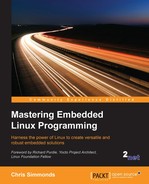The programming interface to the Unix operating system is defined in the C language, which is now defined by the POSIX standards. The C library is the implementation of that interface; it is the gateway to the kernel for Linux programs, as shown in the following diagram. Even if you are writing programs in another language, maybe Java or Python, the respective run-time support libraries will have to call the C library eventually:

The C library is the gateway to the kernel for applications
Whenever the C library needs the services of the kernel it will use the kernel system call interface to transition between user space and kernel space. It is possible to bypass the C library by making kernel system calls directly, but that is a lot of trouble and almost never necessary.
There are several C libraries to choose from. The main options are as follows:
- glibc: Available at http://www.gnu.org/software/libc. It is the standard GNU C library. It is big and, until recently, not very configurable, but it is the most complete implementation of the POSIX API.
- eglibc: Available at http://www.eglibc.org/home. This is the embedded GLIBC. It was a series of patches to glibc which added configuration options and support for architectures not covered by glibc (specifically, the PowerPC e500). The split between eglibc and glibc was always rather artificial and, fortunately, the code base from eglibc has been merged back into glibc as of version 2.20, leaving us with one improved library. eglibc is no longer maintained.
- uClibc: Available at http://www.uclibc.org. The 'u' is really a Greek 'mu' character, indicating that this is the micro controller C library. It was first developed to work with uClinux (Linux for CPUs without memory management units), but has since been adapted to be used with full Linux. There is a configuration utility which allows you to fine-tune its features to your needs. Even a full configuration is smaller than glibc but it is not as complete an implementation of the POSIX standards.
- musl libc: Available at http://www.musl-libc.org. It is a new C library designed for embedded systems.
So, which to choose? My advice is to use uClibc only if you are using uClinux or if you have very limited amounts of storage or RAM and so the small size would be an advantage. Otherwise, I prefer to use an up-to-date glibc, or eglibc. I have no experience of musl libc but if you find that glibc/eglibc is not suitable, by all means give it a go. This process is summarized in the following figure:

Choosing a C library
